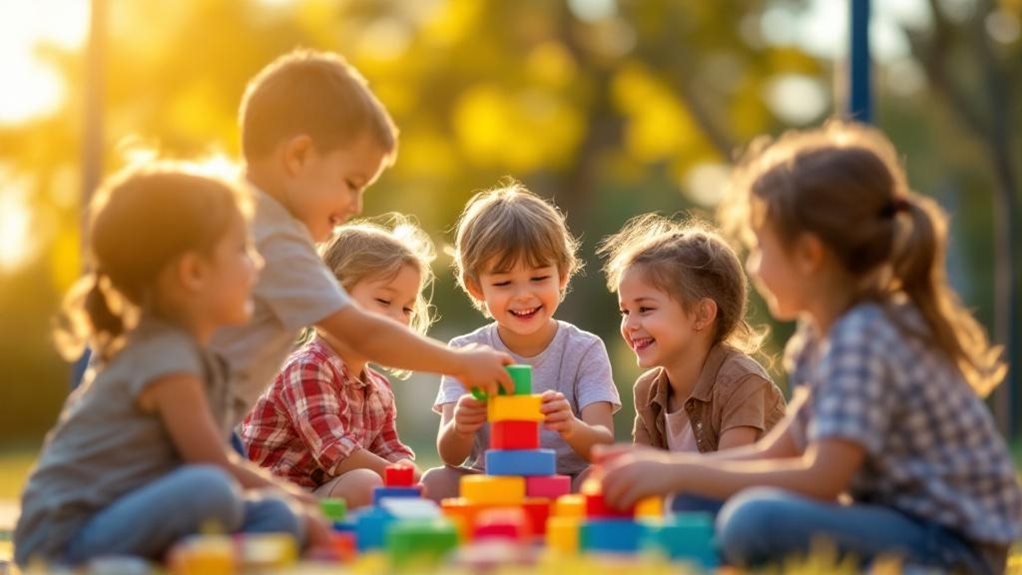Physical Address
304 North Cardinal St.
Dorchester Center, MA 02124
Physical Address
304 North Cardinal St.
Dorchester Center, MA 02124

Overcome peer relationship challenges with five powerful strategies that transform defiant children's social interactions and unlock their hidden potential for meaningful friendships.
You can transform your defiant child’s peer interactions through five evidence-based strategies: implement positive reinforcement systems that reward desired social behaviors with verbal praise and visual tracking, establish structured social skills training programs targeting specific abilities like greetings and emotional regulation, create peer-mediated interventions with trained mentors, develop strong home-school collaboration systems for consistent support, and teach conflict prevention through negotiation models and role-playing activities. These extensive approaches will reveal deeper insights into fostering lasting social connections.
When your defiant child struggles with peer interactions, positive reinforcement becomes a powerful tool for building the social connections they desperately need. You’ll find that recognizing and rewarding desired social behaviors encourages their repetition, creating stronger foundations in attachment and social competence.
Implementing reward systems like verbal praise and visual stickers captures your child’s attention while reinforcing positive peer engagement. These age-appropriate tools foster motivation and resilience, particularly essential for children with behavioral challenges or developmental delays.
Behavioral tracking helps you identify specific social successes to celebrate, shifting focus from negative behaviors to strengths and efforts. Evidence-based programs like Incredible Years create structured environments that support these positive social interactions. This approach enhances emotional regulation and self-esteem, making peer interactions more successful. Your consistent application of these strategies, combined with family support, creates the nurturing environment your defiant child needs to thrive socially.
While positive reinforcement lays the groundwork for social success, structured social skills training programs provide the systematic framework your defiant child needs to develop lasting peer connections. These evidence-based programs focus on systematic skill building through repetitive practice and group settings that foster natural peer interaction.
You’ll want to distinguish between skill acquisition deficits and performance deficits during assessment, as this determines your intervention approach. Structured lessons should target specific social skills like greetings, emotional regulation, and empathy-building activities. The key is intervention flexibility—adjusting strategies as new information emerges about your child’s progress.
Group training programs are particularly effective because they create opportunities for peer modeling and positive relationship building. Visual tools, like feelings thermometers, can help children communicate their emotional states more effectively during these interactions. Remember to involve yourself in the process, ensuring consistency between structured sessions and home practice for maximum carryover.
Although structured social skills training provides essential foundational learning, peer-mediated interventions harness the natural power of peer relationships to create authentic social learning opportunities for your defiant child.
Effective peer selection requires identifying students who demonstrate patience, empathy, and strong social skills. These carefully chosen peers become powerful agents of change through intentional role modeling and positive reinforcement.
To create impactful interventions, focus on these essential elements:
Research shows these interventions achieve effect sizes exceeding 0.8, demonstrating their substantial impact on social skill development and behavioral improvement. Studies demonstrate that implementation fidelity rates of 86% to 94% are essential for maximizing the effectiveness of peer-mediated interventions.
Building on the foundation of effective peer interventions, successful outcomes for defiant children require seamless coordination between home and school environments. You’ll achieve this through effective communication that includes regular updates and feedback loops between parents and educators. Establishing shared goals creates a cohesive support system where everyone works toward common objectives.
Your collaboration should focus on consistent disciplinary approaches across both settings, reducing confusion while increasing intervention effectiveness. Implement behavioral therapy strategies uniformly, using positive reinforcement for desired behaviors in both environments. You’ll need to maintain ongoing communication through parent-teacher conferences and regular progress updates.
When you align interventions between home and school, you create the supportive environment defiant children need to develop better peer interaction skills and social competence.
Since defiant children often struggle with emotional awareness and appropriate conflict responses, you’ll need to focus on teaching them foundational skills that address the root causes of their challenging behaviors. Understanding that defiance often stems from a desire for significance rather than disrespect helps you approach these children with empathy and targeted strategies.
Defiant behavior reflects a child’s quest for significance, not disrespect—approach with empathy and address underlying needs first.
Effective conflict resolution begins with developing emotional awareness through consistent modeling and feedback. You can enhance these skills by:
These evidence-based approaches foster emotional regulation while strengthening peer interaction capabilities.